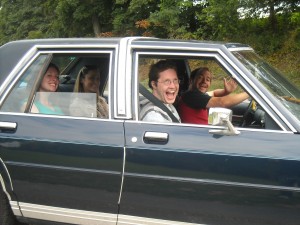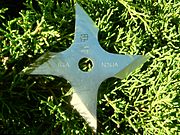I recounted this story to my Advanced Poetry Workshop as a way of introducing a Li-Young Lee poem. They suggested I share it on my blog...
In January 2002, I was at a really weird time in my life. At 32, I was a Lead Writer at the software company I worked at. I made very good money, but I was unhappy because I had inherited two bosses I couldn't stand and I had been promoted into a position I did not enjoy. Instead of being a writer with a few other responsibilities, I had mostly quasi-management responsibilities like project planning and resource scheduling and spent very little time actually writing. But even that was not the whole truth.... The fact is, I felt that Technical Writing--writing about software I could barely use for users whose profession I barely understood, working by-and-large with people who rarely read the sort of books I wanted to read, spending my time with people whose main topic of conversation was their wide-screen TV, their snowmobile, their latest consumer gew-gaw--was not for me. I'll go even further--by giving up poetry for a corporate paycheck, I felt I had sold out. I felt isolated and unhappy, no matter what my bank account said.
But I was lucky to live in Henniker, home of a small liberal arts college with a low-residency MFA program in Poetry. Every July and every January the undergrads mostly left town and the poets came in. You could find them in the local pubs, standing on the stone bridge over the black and rushing Contoocook and staring at the beautiful covered bridge upstream (or standing in the covered bridge taking in the equally lovely stone bridge downstream), buying books in the massive used-book store tucked away above the town, reading their poetry in the student union or in the art gallery.
The whole town was alive with poets and they gave readings almost every night of their week-long residency. The student readings were great: energetic, startling, diverse. No two were alike and each was an anthology of their own influences--this poem stressing Mark-Doty-esque language-play, this one chasing the image-sermon of Mary Oliver. But this program was--at the time--also lucky to have some great poets of national reputation: Gerald Stern, Chard deNiord, Li-Young Lee, and others.
Li-Young Lee! Next to Billy Collins, I think he may be one of the biggest rock stars in poetry. His work is not as accessible as Collins' (and is therefore taken more seriously by the back-bay literature crowd) but it IS gorgeous and very sensual. Combine that with his physical beauty (they might have modeled the male lead in Mulan after him) and the guy draws a crowd.
He was my first poetry crush. When I read Rose, his first collection of poetry, I wanted to shred all of my poems and quit. I wanted to work harder, look harder, listen harder, read deeper... I went back to it over and over, the way you do with a CD that gets under your skin. I got sick of the poems. I sneered at them "Oh, you're so wiiise-lah-D-dah!" I came back to them in penitence. I wanted his voice. My own poems sounded like a donkey braying.
I got in a car with some of the poets I was in grad school with and drove over to Wheeling, West Virginia, just to see him read. His poems were, delivered in person, more magical than I had imagined. If he had started a cult we would have sold our possessions and joined. I must have driven home but I don't remember it.
A few years later, as a young technical writer in KC (still writing poetry), I got a chance to see him read again. Same story. I went to work the next day as if I was on a space walk--only the thinnest of tethers connected me to my computer screen.
Now, it was 5 years later and he was going to be reading in my little village in New Hampshire. Even more, he was going to be giving lectures on poetry at the college and generally hanging around town. I had already emailed a professor to ask if I could attend the lectures as well as the public readings and he had granted me permission (the townsfolk attended some of the readings--especially in the summer--but there wasn't exactly a crowd clamoring to attend the lectures). As January rolled in, I was already bragging to all of my old poet friends in Missouri about the density of poets in New Hampshire (I believe I claimed that you couldn't "swing a cat round here" without hitting a poet).
But something else was creeping up on me. As much as I felt like an outsider at work, I had my doubts with this crowd as well. I'm no big fan of low-residency programs--I don't see the same camaraderie in those programs that was so important to me in my MFA days--but to them, I was a "townie." That hurt. Bad. No matter what my background or interests may have been, for them I was outside of the program and therefore of little interest. Not so different from the way I probably would have reacted to an outsider during my own grad school days.
So I went to the reading, carrying Li-Young Lee's latest book to get it signed (I'm lucky to have four signed books from Lee). It was snowing heavily and the streets of Henniker were quiet and already dark as I crossed the stone bridge. There were one or two other "townies" there, but by and large the crowd consisted of students and faculty of the poetry program. It was his best reading. He was charming. He introduced each piece in a way that enlarged your understanding without giving away the surprise and pleasure of the poem. He read each poem as if it were an incantation. After the reading, he took questions then stood at the podium to sign books and do the meet&greet. I waited. The rest of the room divided into groups chatting and making plans and as he looked up from each person, they were released to move to this group or another until it was just he and I.
I was in sheer terror and awe of him, but I managed to stammer out a few sentences. He seemed genuinely interested (and touched that I felt so strongly about his work). We chatted for what seemed a few seconds--about his work, about mine, about an ad I was thinking of responding to for a teacher up at Plymouth State College--and then I looked up and the place was almost empty. It had been 30 minutes. A few people from the program were waiting for him to finish so they could move on to the college pub, located down the hall in the same student union where the reading had been.
He invited me to join them. Let me repeat that: he invited me to join them. On the one hand, I was almost light-headed with pleasure--my poetic hero wanted me to join him and his friends. But another part of me was filled with dread. I was a townie. I was a technical writer. I was a sell out. I was older than the students, less accomplished than the faculty. I was an outsider.
Like a coward, I made up some lame excuse and walked back across the bridge in the snow.
If I've ever felt more wretched about myself, I can't think of a time. Worse than the fear and the self-loathing, I felt more isolated and lonely than I can ever remember. I recognized that I was lost--and had been for more than a year--and the sadness and terror was sliding around inside my guts like an oil slick. Even worse, I felt that I was walking away from my last chance--not just with this group, but the faint glimmer of hope I had felt about the teaching position at PSC.
At home, I walked into the kitchen where my wife was making a cup of tea. How did it go? When I told her--breathless and ashamed with snow melt from my boots puddling on the floor--she pushed me out the door. "What are you crazy? You'll want to kill yourself tomorrow if this is how you leave it!" Ten seconds later I was heading for the bridge again, pumping myself up a little. "I won the goddamned AWP Intro Award as a grad student!" I had published in some of the best quarterlies! They had no right to make me feel like a townie!
So I stomped back across the bridge and up to the Simon Center and down the hall to the pub which--with all of the undergrads gone would be populated exclusively with poets...like me. But at the last instant, as cliched as it may be, I froze with my hand on the door handle. The terror and the self-loathing and the isolation were so powerful that I could not imagine opening the door. What would I say to them? How would I justify my intrusion? Why SHOULD they invite me in?
Just then, someone opened the bathroom door across the hall and made their way toward the pub. In a panic, I could either flee back into the storm, or I could open the door and go in. I'm sure it didn't happen this way exactly, but here's what I remember: all of the poets were seated at one long table running the length of the room. Twenty-five faces turned to me. Some narrowed their eyes, trying to figure out who I was, why I was there. Some wondered if I was lost. Some wondered if I was wounded--my face was surely white and drawn in fear. Then, in the middle of the table like Jesus at the last supper, Li-Young Lee rose and extended his right hand toward me. "Excuse me, everyone," he said to the quiet room. "This is Scott. He's a poet. Make a space for him."
In American movies, they would have accepted me as one of their own. Maybe even carried me around the room on their shoulders. It wasn't like that. I pulled up a chair. Had a forced conversation with several of the poets around me. And was slowly excluded to the point where, like a impurity that works it way out of the body through a red angry sore that you have to ignore away, I was pushed back out of the room.
But it didn't matter. Lee's gesture, which cost him absolutely nothing, meant all the world to me. We all need a tribe. We all need something to call ourselves because our name (who we are) is pointless without our essence (what we are). It didn't matter that they could not see me as one of their own--they were still discovering what they were. Li-Young Lee had recognized me. His gesture helped me recognize myself even in the disguise I had worn for so long. I knew that I would apply for the teaching job at Plymouth. And if that one didn't work out, I would apply for another. I might even chase a PhD. I wasn't lost, and though I was a long way from the path, I thought I had it in me to find it again.
The lectures were great. Every evening that week, I talked poetry. And all day I drifted in it, even as I tried to concentrate on project planning. On Friday, I sent my CV and letter to PSC. Two weeks later, Liz Ahl called. Two weeks after that I interviewed in the lounge of Ellen Reed House. Here I am.
I owe Li-Young Lee.
His poetry is beautiful--ripe, silken, smart. You don't need my story to see that the man is a mineral spring--restorative, mesmerizing. Check out this Youtube video of an entire Li-Young Lee reading.



